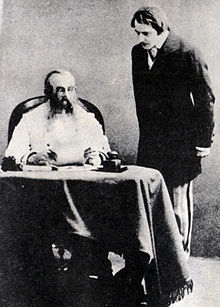Enough Stupidity in Every Wise Man (Russian: На всякого мудреца довольно простоты; translit. Na vsyakogo mudretsa dovolno prostoty), sometimes published in English under the title Too Clever By Half, is a five-act comedy by Aleksandr Ostrovsky.[1] The play offers a satirical treatment of bigotry and charts the rise of a double-dealer who manipulates other people's vanities.[2] It is Ostrovsky's best-known comedy in the West.[3]
| Enough Stupidity in Every Wise Man | |
|---|---|
 | |
| Written by | Aleksandr Ostrovsky |
| Date premiered | 13 November [O.S. 1 November] 1868 |
| Original language | Russian |
| Genre | Comedy |
Production history
edit1868 – Alexandrinsky Theatre, Saint Petersburg.
1868 – Maly Theatre, Moscow.
1885 – Korsh Theatre, Moscow.
Russian theatre director Konstantin Stanislavsky directed the play with his Moscow Art Theatre.[4] The production opened on 23 March [O.S. 11 March] 1910.[4] Stanislavski played General Krutitsky[4] and Kachalov played Glumov.
A production of the play was the most significant of the early theatre work of the Russian Soviet film director Sergei Eisenstein.[5] The playwright Sergei Tretyakov transformed Ostrovsky's text into a revue (what Eisenstein called a "montage of attractions"), which was entitled Wiseman (Mudrets).[6] Eisenstein and Tretyakov's approach was part of the Russian avant-garde Futurist movement known as "Eccentricism," which sought the "circusisation" of the theatre.[7] In celebration of the centennial of Ostrovsky's birth, the production opened in April 1923.[8] It was staged by the First Workers' Theatre of the Prolekult in its theatre in the Arseny Morozov House, an ornate mansion on Vozdvizhenka Street, with a cast that included Maxim Shtraukh, Ivan Pyryev, and Grigori Aleksandrov.[9] Eisenstein drew on popular theatre techniques such as farce and the commedia dell'arte in his staging, which sought to make every metaphor concrete and physical; he wrote:[10]
A gesture turns into gymnastics, rage is expressed through a somersault, exaltation through a salto-mortale, lyricism by a run along a tightrope. The grotesque of this style permitted leaps from one type of expression to another, as well as unexpected intertwinings of the two expressions.[11]
A screening of Eisenstein's first film, entitled Glumov's Diary, concluded the performance.[5] Writing in 1928, Eisenstein explained that he had aimed "to achieve a revolutionary modernization of Ostrovsky, i.e., a social re-evaluation of his characters, seeing them as they might appear today."[12]
Boris Nirenburg and A. Remizova directed an adaptation of the play for television in 1971.[13]
References
edit- ^ Brockett and Hildy (2003, 370). The play's title has been rendered in English in many different ways in the critical literature, including: The Diary of a Scoundrel, which Brockett and Hildy give as an alternative; or simply The Scoundrel, in Gerould (1974, 73); Even Wise Men Err in Sealey Rahman (199, 174); Even a Wise Man Stumbles, in Magarshack (1950, 309).
- ^ Banham (1998, 829), Brockett and Hildy (2003, 370), and Gerould (1974, 73).
- ^ Banham (1998, 829) and Brockett and Hildy (2003, 370).
- ^ a b c Benedetti (1999, 212, 387).
- ^ a b Rudnitsky (1988, 96).
- ^ Gerould (1974, 73–74), Kleberg (1980, 81), and Rudnitsky (1988, 96).
- ^ Kleberg (1980, 78–82), Kolocotroni, Goldman, and Taxidou (1998, 295–297), and Rudnitsky (1988, 94–96).
- ^ The sources offer different dates for the opening: Gerould gives 16 April while Kleberg gives 26 April; see Gerould (1974, 73) and Kleberg (1980, 80–81).
- ^ Gerould (1974, 74), Kleberg (1980, 80–81), and Rudnitsky (1988, 96).
- ^ Gerould (1974, 74).
- ^ Quoted by Gerould (1974, 75).
- ^ Quoted by Gerould (1974, 73).
- ^ Na vsyakogo mudretsa dovolno prostoty at IMDb .
Sources
edit- Banham, Martin, ed. 1998. The Cambridge Guide to Theatre. Cambridge: Cambridge UP. ISBN 0-521-43437-8.
- Benedetti, Jean. 1999. Stanislavski: His Life and Art. Revised edition. Original edition published in 1988. London: Methuen. ISBN 0-413-52520-1.
- Brockett, Oscar G. and Franklin J. Hildy. 2003. History of the Theatre. Ninth edition, International edition. Boston: Allyn and Bacon. ISBN 0-205-41050-2.
- Gerould, Daniel. 1974. "Eisenstein's Wiseman." The Drama Review 18.1 (March): 71–85.
- Kleberg, Lars. 1980. Theatre as Action: Soviet Russian Avant-Garde Aesthetics. Trans. Charles Rougle. New Directions in Theatre. London: Macmillan, 1993. ISBN 0-333-56817-6.
- Kolocotroni, Vassiliki, Jane Goldman, and Olga Taxidou, eds. 1998. Modernism: An Anthology of Sources and Documents. Edinburgh: Edinburgh University Press. ISBN 0-7486-0973-3.
- Leach, Robert, and Victor Borovsky, eds. 1999. A History of Russian Theatre. Cambridge: Cambridge UP. ISBN 0-521-43220-0.
- Magarshack, David. 1950. Stanislavsky: A Life. London and Boston: Faber, 1986. ISBN 0-571-13791-1.
- Rudnitsky, Konstantin. 1988. Russian and Soviet Theatre: Tradition and the Avant-Garde. Trans. Roxane Permar. Ed. Lesley Milne. London: Thames and Hudson. Rpt. as Russian and Soviet Theater, 1905–1932. New York: Abrams. ISBN 0-500-28195-5.
- Sealey Rahman, Kate. 1999. "Aleksandr Ostrovsky – Dramatist and Director." In Leach and Borovsky (1999, 166–181).